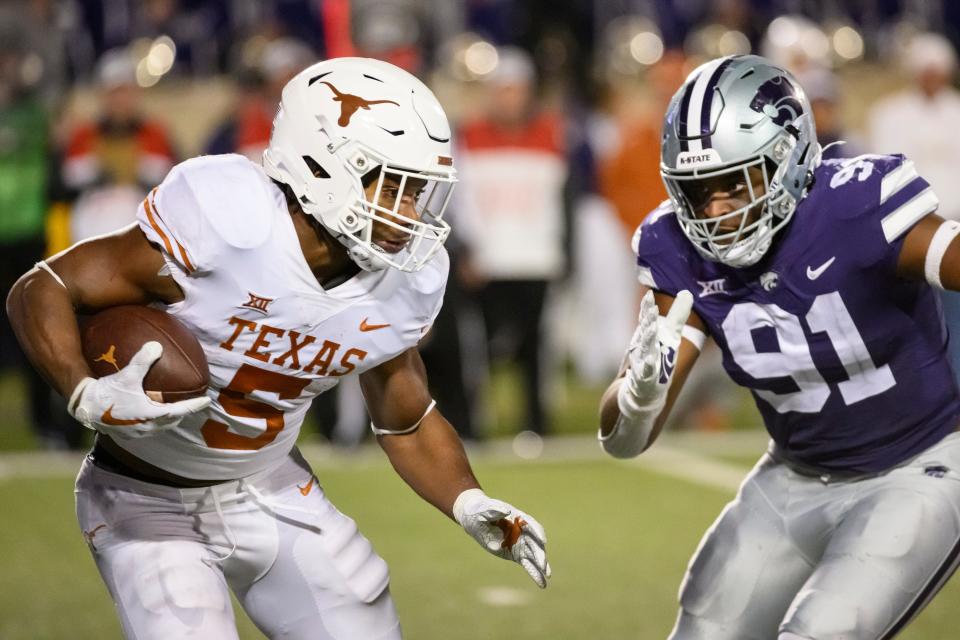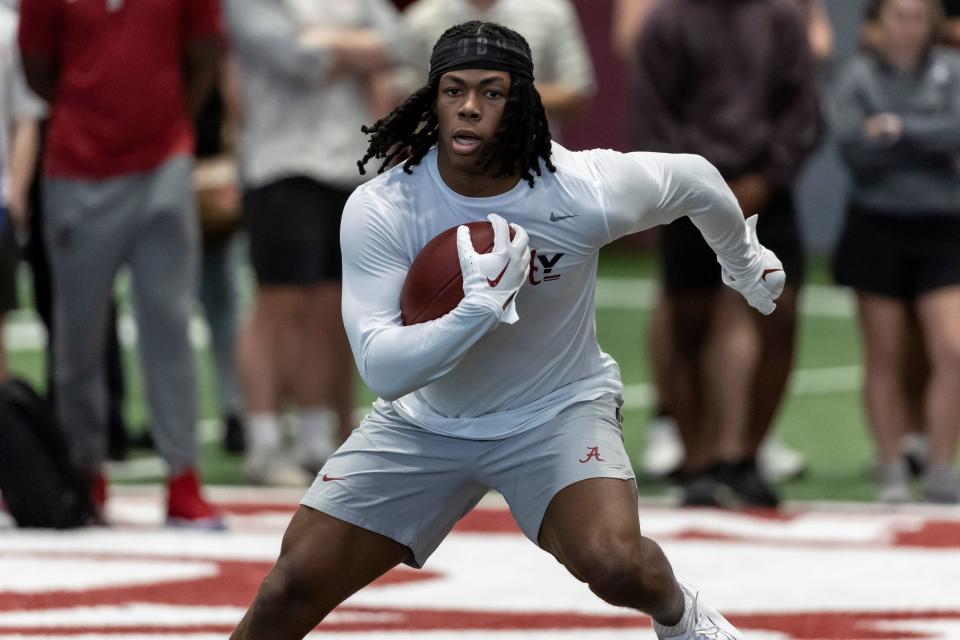Did Eagles owner tip his hand on taking one of top running backs in Round 1 of NFL draft?
For the past two drafts, it was always expected that the Eagles would draft a cornerback or safety in the early rounds.
That was their biggest need, and it's still among them heading into the three-day NFL draft that begins April 27.
Yet the Eagles have always gone offense instead, and there's a good chance they will do it again with at least one of their two first-round picks (No. 10 and No. 30).
The Eagles have had 10 picks in either the first or second rounds in the last five drafts. They picked offensive players with nine of them. That includes two straight seasons of drafting wide receivers in the first round − Jalen Reagor in 2020 and DeVonta Smith in 2021. They also traded one of their first-round picks last spring for A.J. Brown, another wide receiver.
TRADING FRENZY: Eagles trade-filled mock draft: Why they'll end up with a 1st-round RB (not Bijan Robinson)
YOUNG STARS: From 'I (expletive) hate this place,' 2 young Phillies shine as Harper does something new
The only defensive player taken in either the first or second round over the last five years was defensive tackle Jordan Davis in the first round last spring.
Not only that, but the Eagles could do something they haven't done since 1986 − use one of those two first-round picks on a running back.
It's easy to see why.
"Offenses dominate in this league," Eagles chairman and CEO Jeffrey Lurie told reporters at the NFL annual meeting in late March. "That’s why we’ve always focused more resource allocation on making sure we have an outstanding offense because it is very hard to stop."
The Eagles, coming off a Super Bowl season, already have one of the NFL's most unstoppable offenses, led by quarterback Jalen Hurts who threw for 3,701 yards and ran for 760 more. Brown set a franchise record with 1,496 yards receiving, Smith added 1,196 yards, and tight end Dallas Goedert had 702 yards despite missing five games with a shoulder injury.
In addition, the Eagles have long had one of the top offensive lines in the NFL. That should be the case again with center Jason Kelce returning for a 13th season and right tackle Lane Johnson considered the best right tackle in the NFL.
So why would the Eagles take a running back in the first round, whether it's Texas' Bijan Robinson at the No. 10 pick (or a trade back to the mid- to late teens), or Alabama's Jahmyr Gibbs with the No. 30 pick? Especially after the Eagles already signed a running back in free agency in Rashaad Penny to replace Miles Sanders, who had 1,269 yards rushing last season.
The answer is money. As in, not having to pay much of it.
We saw that during the offseason, when running backs were three of the six players given the franchise tag. That included the NFL's rushing leader in Josh Jacobs, the No. 4 rusher in Giants' Saquon Barkley, along with Dallas' Tony Pollard.
For running backs, the franchise tag is a one-year contract worth $10.9 million. Compare that with the franchise tag for quarterbacks, which is $32.4 million.
For a first-round pick, that means a team has salary control for up to six years. That's because teams can pick up fifth-year options for first-round picks after the third year. Then after the fifth year (fourth if the team declines the fifth-year option), the franchise tag is available.

Barkley, entering his sixth season, is an example of this cost control for a running back. He was the No. 2 overall pick in 2018. Assuming Barkley signs the tag, the Giants will pay out a total of $48 million for six seasons. There are two quarterbacks − Aaron Rodgers and Russell Wilson − making more than that total this season alone in average annual value.
Keep in mind that the average shelf life for a running back is 3.5 years.
So taking someone like Gibbs, who had 926 yards rushing and 444 receiving last season, at the end of the first round potentially gives the Eagles six years with Gibbs and Hurts together. That's assuming the Eagles sign Hurts to a long-term extension.
The same is true of Robinson, who's considered the top running back in the draft, and compared by many to Barkley. Robinson had 1,580 yards rushing last season. Both he and Gibbs averaged 6.1 yards per carry last season.
"My philosophy on running backs is I don't mind taking a running back in the first round, as long as your team is ready to win right now," NFL Network draft analyst Daniel Jeremiah said on a recent conference call. "If you take into account the guy has four, five, or six years of elite production, I don't mind getting him in the first round because you get the extra year on the contract. It's easy to control. Then I have a franchise tag number if I want, and that could kind of take me through all of his prime.
"But I don't want to waste carries on a crappy team. ... To take a big-time running back like that, and your team stinks, you're going to waste his prime, and it's not going to do anything for you."
In addition, drafted running backs typically play and contribute right away. ESPN draft analyst Mel Kiper said that's a reason why a team doesn't need to draft a running back in the first round. After all, there have certainly been a number of cases where late-round running backs have starred right away.
The Chiefs, for example, got great production last season from Isiah Pacheco, who was drafted in the seventh round last spring. He rushed for 830 yards. He had 76 yards on 15 carries against the Eagles in the Super Bowl.
"I've always said there isn’t a similar position in football where a rookie running back can play better, and be expected to play as good or better that (rookie) year, than his entire career," Kiper said. "They're plug and play as long as they can block. So for (Robinson), it's not a fact of ... (teams) don't value running backs at all. It’s just first-round running backs, you don’t need to draft one in the first round."
The question for the Eagles is do they actually need to draft another running back, especially in the first round, with a rotation consisting of Penny, Boston Scott, Kenny Gainwell and Trey Sermon?
Eagles coach Nick Sirianni, for one, said this at the NFL owners meetings last month: "We feel really good about the room as it is right now."

But Penny, who's 27, hasn't played in more than 10 games in a season since that rookie year. Both he and Scott are signed only for this season. Gainwell, the Eagles' fifth-round pick in 2021, came on strong late last season, but he still hasn't reached 300 yards rushing in a season.
Sermon, meanwhile, was a third-round pick of the 49ers in 2021 and released after just one season.
There's little doubt that a rushing duo of Hurts and someone like Robinson or Gibbs would be lethal, to go along with all of the Eagles' other offensive weapons.
As for the notion of the Eagles overlooking defense in the draft, look no further than their two trips to the Super Bowl in the past five seasons.
They won the Super Bowl in 2017-18 despite Patriots quarterback Tom Brady throwing for 505 yards. There was only one punt in the entire game. Then in February, the Eagles gave up 38 points (31 of them by the defense) to the Chiefs despite having the No. 2 ranked defense in the NFL and the top-ranked pass defense. The Eagles' 70 sacks were only two short of the NFL record.
The Chiefs, meanwhile, only had the 11th-ranked defense in the NFL.
"You can have a really good defense, but it’s very hard to stop a really dynamic offense," Lurie said. "In our two Super Bowls, neither offenses were stopped very often."
If at all.
Contact Martin Frank at mfrank@delawareonline.com. Follow on Twitter @Mfranknfl.
This article originally appeared on Delaware News Journal: NFL draft: Why Eagles need RB Bijan Robinson or Jahmyr Gibbs in Round 1

